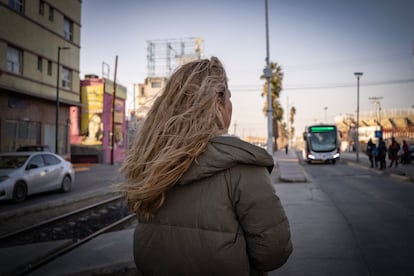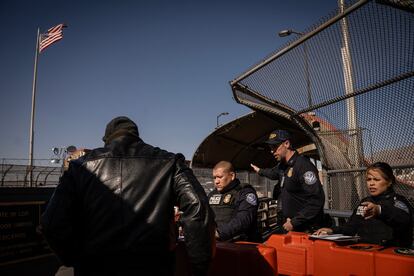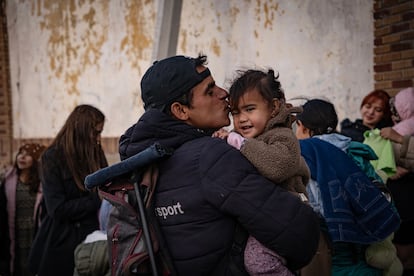Sol has a CBP One appointment in 10 days, but Trump could stop her from reuniting with her kids
This Venezuelan teacher obtained a date to request asylum in the US after a year of waiting in Mexico. Her children are already on American soil, but she worries the president-elect could cancel the program


God is great and He knows why he does what he does, according to Sol, who is wearing a borrowed coat, sandals and socks to keep out the cold wind in Ciudad Juárez. Only He knows why she and her two sons, ages 10 and 16, waited for a year for an appointment through the CBP One application to request asylum on humanitarian grounds in the U.S., but never got one. Only He knows why, after the boys turned themselves over to the border patrol after losing sight of their mother, it was then that Sol received the long-awaited confirmation for an interview on January 29, 2025, nine days after Donald Trump’s inauguration. At first she was beside herself with excitement, then a sense of dread crept in: “What do I do if Trump does away with the appointments? How will I see my children?”
Sol is a tall, blonde Venezuelan teacher. She scolds the kids at the shelter for smoking as she once did with her students; and she grabs the hot coffee handed out by an NGO to take to an elderly man who can’t stand up to get in line. “Wait for me here, I’ll be right down,” Sol tells him. She is one of the thousands of migrants who have been waiting for months on Mexican territory for the U.S. government to confirm their asylum appointment through CBP One, which is free to register to. It’s either that or cross the border illegally with a guide or coyote, as they are known. Since the CBP One system was introduced in January 2023, more than one million migrants have opted to take this legal route.
But, during his election campaign, Trump promised to get rid of the CBP One system that allows for humanitarian parole: “Get ready to leave,” he said then, directing the message to anyone who had been granted parole on humanitarian grounds. Now, as he takes his place in the White House, the threat has become real. Fear is everywhere. Priests who manage migrant shelters, such as Juan Fierro, from El buen Samaritano, tell it like this: “All this will achieve is to boost crime, without a doubt.” Meanwhile, researchers specialized in migration, such as Rodolfo Rubio, from El Colegio de Chihuahua, add: “If CBP One disappears, the migrants will have very few options left. Those who are stranded here will have to return to their countries of origin, and many cannot. Either that or they fuel the market for smugglers.”

The migrants wait, sharing a sense of trepidation. Angelica has been waiting in Juarez for 11 and a half months after leaving Michoacán in Mexico; Gloria and her family have been waiting for 11 months after leaving Guatemala; Roxana Cuyun left Chiapas seven months ago; Irene and her four children have been gone from Puebla, Mexico, for four. All are fleeing violence, domestic violence, organized crime, or their government. All are clicking every day on the application to see if they have been granted an interview; all are concerned for the future, particularly Sol, who has been separated from her children by the border and, perhaps too, the promises of an incoming president.
Sol says she was slow to leave Venezuela. She wanted to wait in case things improved at home. She was the principal of a high school in Falcón, in the north of the country, and when she got divorced, she got custody of her three children. Besides giving class, she cleaned hotels and worked in a nursing home, and also set up a business. At one point, she was receiving $20 a month from Nicolás Maduro’s government as well as her share of police harassment.
The first of her family to emigrate was her eldest son, who left for Chicago after being hounded by the Chavista regime. She has not seen him for more than two years. On January 8, 2024, she and the two younger ones tried to follow. The dream has always been the same, for all four to be together again. “We crossed all the countries that everyone crosses, and also the jungle,” she says quickly, but that is not the worst of the story. On January 22, they settled in Mexico City, where Sol got a night shift in a printing company. That kept them going until the beginning of December 2024, when several groups of Venezuelans decided to try to cross the border into the U.S. The 18th was Migrant’s Day, but they were misinformed about their chances.

“The cold on top of the train... there’s nothing that can compare to it,” Sol says of the trip on the freight train known as La Bestia (The Beast). “That’s what my children endured.” That journey was followed by hours on foot, encounters with the police and the National Guard, pleas and fear. Finally, they arrived in Juarez, ready to cross. They tried to do so with a group of families; they crouched in the night, hiding from the trucks that could either belong to border police or a cartel. The cartel may kill you, but the border patrol will send you back, Sol observes. They crossed the river and arrived at the border soaking wet in freezing temperatures. “We were misinformed,” says Sol. “They told us to buy gloves and balaclavas for the cold. But all of that got wet when we crossed the river. Then we had to undress the children and wrap them in a blanket. The temperature is low enough to give you hypothermia if you’re wet.”
They were about three meters from the hole in the border fence when a girl in front of them got caught in the wire and started screaming. The U.S. patrol arrived and made them walk for 12 hours, promising they would be allowed across. “There wasn’t even a road. It was pure brush, and mud from the river. It was like the jungle all over again. I lost my shoes. I walked barefoot, with cuts on my feet,” Sol explains. The group never made it to the other side. When they arrived back at the shelter, almost a day later, the children were feverish.
“By then, we had no more money,” Sol says. They didn’t have the 100 pesos a day that the shelter cost per person; they had nothing for food. On January 10, Sol’s children lost sight of her and ended up handing themselves over to the border patrol. “With all we’ve been through, to be separated now? Am I a bad mother?” she asks over and over. Three days after she lost her children, she was notified by email that her CBP One registration had been approved: “But just mine, they are already there,” she sobs. “It’s for the 29th, after Trump is in office, and if he cancels the appointment, how do I get through? Do you understand me? How do I get through? I read, I look for news, I get on TikTok, I get on Facebook...” and no one has any answers.
Sol’s children are now in a center in Brownsville, Texas, near Matamoros, 12 hours from Juarez. “If I get across, I will look for them, and if they are returned, I will go back to wherever they are returned to,” she says firmly. “The economic situation in your own country forces you to separate from your family members, and if you emigrate you also get separated. Now we are uncertain, but I hope our story will touch someone’s heart there. That a period of grace will be allowed, and that the appointments that are already approved can go forward and that those that are not, at least give us another option. Many families depend on this to be reunited.”

Sign up for our weekly newsletter to get more English-language news coverage from EL PAÍS USA Edition
Tu suscripción se está usando en otro dispositivo
¿Quieres añadir otro usuario a tu suscripción?
Si continúas leyendo en este dispositivo, no se podrá leer en el otro.
FlechaTu suscripción se está usando en otro dispositivo y solo puedes acceder a EL PAÍS desde un dispositivo a la vez.
Si quieres compartir tu cuenta, cambia tu suscripción a la modalidad Premium, así podrás añadir otro usuario. Cada uno accederá con su propia cuenta de email, lo que os permitirá personalizar vuestra experiencia en EL PAÍS.
¿Tienes una suscripción de empresa? Accede aquí para contratar más cuentas.
En el caso de no saber quién está usando tu cuenta, te recomendamos cambiar tu contraseña aquí.
Si decides continuar compartiendo tu cuenta, este mensaje se mostrará en tu dispositivo y en el de la otra persona que está usando tu cuenta de forma indefinida, afectando a tu experiencia de lectura. Puedes consultar aquí los términos y condiciones de la suscripción digital.








































